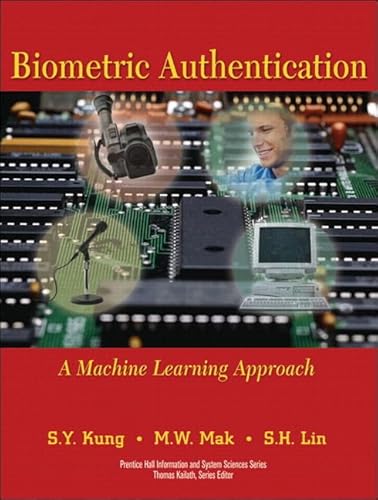Biometric Authentication: A Machine Learning Approach (paperback) (Prentice Hall Information and System Sciences Series) - Softcover

Synopsis
Today's security systems are farm from perfect, leaving the world's free citizensvulnerable to criminal activity ranging from computer viruses to terroristcampaigns. One of the most paramount challenges of today's engineers isidentifying and tracking individuals who are capable of committing such acts.This task will become less complex with the advent of the latest authenticationand recognition technology - mainly biometric authentication.This book presents practical ways of implementing biometric authenticationsystems based on human faces and voices. It bridges the gap betweenbiometric research (the theoretical aspect of pattern classification) andbiometric system design(the system design and deployment issues of biometricsystems).After reading this book Engineers will be able to build reliable applications thatwill support today's robust authentication systems - securing us all.
"synopsis" may belong to another edition of this title.
About the Author
Sun-Yuan Kung is a professor of electrical engineering at Princeton University. His research and teaching interests include VLSI signal processing; neural networks; digital signal, image, and video processing; and multimedia information systems. His books include VLSI Array Processors and Digital Neural Networks (Prentice Hall PTR).
Man-Wai Mak is an assistant professor at The Hong Kong Polytechnic University and chairman of the IEEE Hong Kong Section Computer Chapter. His research interests include speaker recognition, machine learning, and neural networks. Shang-Hung Lin is a senior architect at Nvidia, a leader in video and imaging products.From the Back Cover
- A breakthrough approach to improving biometrics performance
- Constructing robust information processing systems for face and voice recognition
- Supporting high-performance data fusion in multimodal systems
- Algorithms, implementation techniques, and application examples
- How machine learning approaches differ from conventional template matching
- Theoretical pillars of machine learning for complex pattern recognition and classification
- Expectation-maximization (EM) algorithms and support vector machines (SVM)
- Multi-layer learning models and back-propagation (BP) algorithms
- Probabilistic decision-based neural networks (PDNNs) for face biometrics
- Flexible structural frameworks for incorporating machine learning subsystems in biometric applications
- Hierarchical mixture of experts and inter-class learning strategies based on class-based modular networks
- Multi-cue data fusion techniques that integrate face and voice recognition
- Application case studies
"About this title" may belong to another edition of this title.
Other Popular Editions of the Same Title
Search results for Biometric Authentication: A Machine Learning Approach...
Biometric Authentication: A Machine Learning Approach (Prentice Hall Information and System Sciences Series)
Seller: Revaluation Books, Exeter, United Kingdom
Paperback. Condition: Brand New. 1st edition. 496 pages. 9.08x7.04x1.05 inches. In Stock. Seller Inventory # zk0137074832
Buy New
Ships from United Kingdom to U.S.A.
Quantity: 1 available

